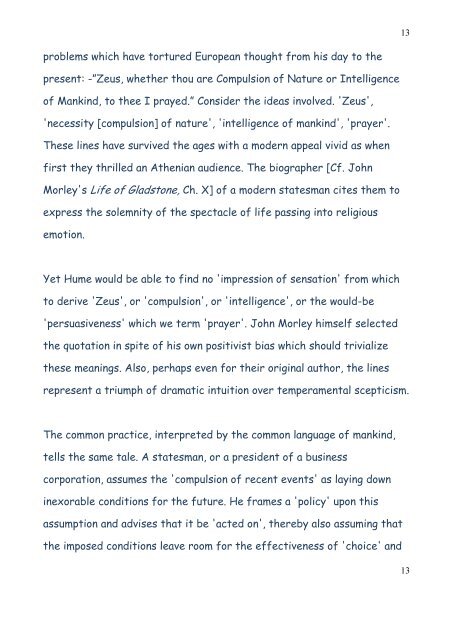The Metaphysical Foundation of Buddhism and Modern Science
The Metaphysical Foundations of Buddhism and Modern Science: Nagarjuna and Alfred North Whitehead
The Metaphysical Foundations of Buddhism and Modern Science: Nagarjuna and Alfred North Whitehead
Create successful ePaper yourself
Turn your PDF publications into a flip-book with our unique Google optimized e-Paper software.
13<br />
problems which have tortured European thought from his day to the<br />
present: -”Zeus, whether thou are Compulsion <strong>of</strong> Nature or Intelligence<br />
<strong>of</strong> Mankind, to thee I prayed.” Consider the ideas involved. 'Zeus',<br />
'necessity [compulsion] <strong>of</strong> nature', 'intelligence <strong>of</strong> mankind', 'prayer'.<br />
<strong>The</strong>se lines have survived the ages with a modern appeal vivid as when<br />
first they thrilled an Athenian audience. <strong>The</strong> biographer [Cf. John<br />
Morley's Life <strong>of</strong> Gladstone, Ch. X] <strong>of</strong> a modern statesman cites them to<br />
express the solemnity <strong>of</strong> the spectacle <strong>of</strong> life passing into religious<br />
emotion.<br />
Yet Hume would be able to find no 'impression <strong>of</strong> sensation' from which<br />
to derive 'Zeus', or 'compulsion', or 'intelligence', or the would-be<br />
'persuasiveness' which we term 'prayer'. John Morley himself selected<br />
the quotation in spite <strong>of</strong> his own positivist bias which should trivialize<br />
these meanings. Also, perhaps even for their original author, the lines<br />
represent a triumph <strong>of</strong> dramatic intuition over temperamental scepticism.<br />
<strong>The</strong> common practice, interpreted by the common language <strong>of</strong> mankind,<br />
tells the same tale. A statesman, or a president <strong>of</strong> a business<br />
corporation, assumes the 'compulsion <strong>of</strong> recent events' as laying down<br />
inexorable conditions for the future. He frames a 'policy' upon this<br />
assumption <strong>and</strong> advises that it be 'acted on', thereby also assuming that<br />
the imposed conditions leave room for the effectiveness <strong>of</strong> 'choice' <strong>and</strong><br />
13


















